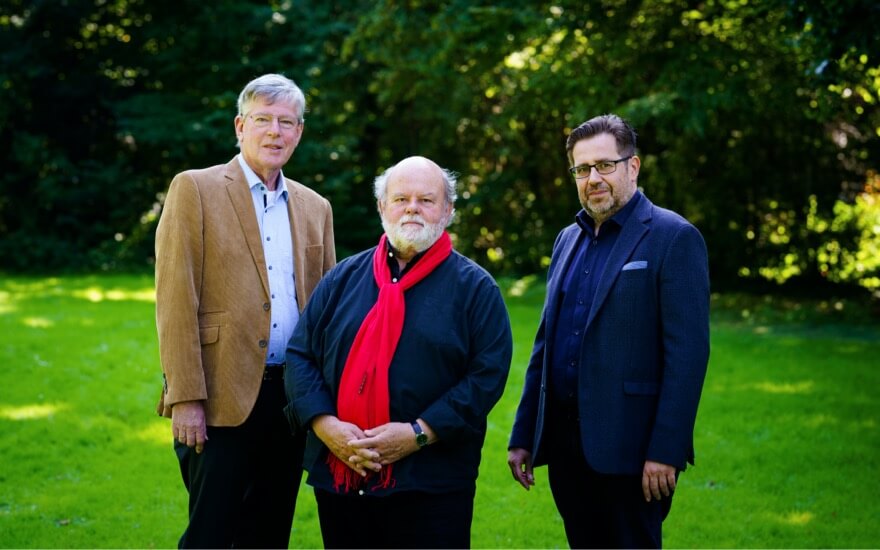From resilience to hybrid working: are you ready for a culture shift?
Published on 12/11/2021 in Inspire
Over the last 18 months, the labor market and our way of working (together) have undergone a radical change. What impact will the final breakthrough of hybrid working have on leadership, resilience, and our mental well-being?

The Covid crisis has turned the HR rules in companies and organizations upside-down. Digital transformation demands the utmost from employees. Resilience and agility are central to this. How does hybrid work fit into this picture? Matthieu Weggeman, Jimme Keizer and Bart Derre, all of whom closely follow this theme and keep their finger on the pulse of new HR-trends, explain what they mean.
Resilience in organizations: coping with radical change
Resilience is about responding flexibly and quickly to (unexpected) changes. This means that your organization should be able to deviate from standard procedures to allow employees to devise and implement actions that promote resilience. But, of course, that freedom is limited. The mission and goals at the organizational level are still providing a framework. However, it is important that mistakes are not punished.
Resilience and agility are not new concepts. But the Covid crisis has put these phenomena on edge. The disappearance of economic certainties and classic hierarchical structures has triggered many employers to redesign existing organizational procedures. The numerous lockdown measures also boosted creativity and innovative entrepreneurship. Resilience post-Covid has become synonymous with effectual reasoning, taking control and identifying strengths and weaknesses within the organizational environment.
Resilient organization requires agile people and new skills
All too often the term resilience is used to signify a counter-reaction to a negative event. But resilience also means that organizations and individuals have the power to raise the bar higher and higher.
Resilience in organizations requires new digital skills
Jimme Keizer - University Lecturer at the Technical University of Eindhoven
In the past year and a half, many organizations have proved that – with focus on employees – they can quickly adapt to new market situations and demanding customers. This approach is impossible without the deployment of new digital skills. Furthermore, constantly detecting what is going on with customers and other stakeholders, how competitors are performing and which new trends and evolutions could have an impact on your own organization. Sharing those ideas internally is crucial.
Loyal contraries: without sleepers there are no tracks
Critically questioning (ingrained) standard procedures and guidelines is an important success factor for agile and resilient organizations. Internal entrepreneurship should therefore not be penalized. This means that employees – at all levels – should be encouraged to think critically about possible improvement processes.
Don't punish making mistakes, but encourage innovativeness and creativity
Bart Derre – Director of the HOGENT E-LAB
A healthy balance between loyalty and contrariness produces refreshing ideas. Do not turn your colleagues into followers, but do not turn them into anarchists either. Make sure they grow into articulate ambassadors of their own organization.
Hybrid work: the best of both worlds?
Just like the term 'resilience', working independent of time and place is not a new phenomenon. Structural teleworking was already well established in many companies, although it is difficult to apply in some sectors (such as healthcare or manufacturing). Working from home is all about work design: choosing the best working conditions to work as productively as possible. This work form is also about realizing a culture shift, with autonomy, competencies and belonging as key drivers to get and keep happy employees on board.
Hybrid working focuses on productivity and output, not control
Mathieu Weggeman – Professor of Organizational Anthropology at the University of Eindhoven
The Covid crisis has accelerated the process, resulting in hybrid working. Employers now focus on maximum productivity (linked to mental well-being) and output, rather than control. Scientific research shows that hybrid work has a positive impact on productivity and job satisfaction of employees.
Need for new management skills
Is it all sunny uplands when working in a hybrid environment? Certainly not. Managers seem to have ended up in a management game, in which their leadership skills are no longer fully appreciated. Employees miss social cohesion with colleagues and the link with the organization. It is therefore essential to take targeted action to remove these potential bottlenecks.
Introducing continuous feedback, maximizing informal contact moments between colleagues and resetting management skills are just a few examples. In addition, we also recommend using virtual contact moments as effectively as possible (meaning short, functional consultations) and providing thorough, customized monitoring of employees, based on their personality traits.
Mathieu Weggeman is professor of Organization Science (Innovation Management) at the Faculty of Industrial Engineering & Innovation Sciences of Eindhoven University of Technology. In 2008, his book ‘Leiding aan professionals? Niet doen!’ won the Management Book of the Year Award.
Jimme Keizer is associate professor at the Faculty of Industrial Engineering & Innovation Sciences of the Technical University of Eindhoven. He is a former professor at the Zuidhogeschool Limburg.
Bart Derre is director of the HOGENT E-LAB (Center for Entrepreneurship). He combines teaching with a PhD research project at Eindhoven University of Technology on designing effective entrepreneurship education.
One
One magazine is the Proximus B2B magazine for CIOs and IT professionals in large and medium-sized organisations.